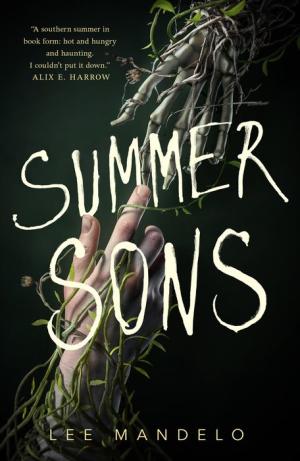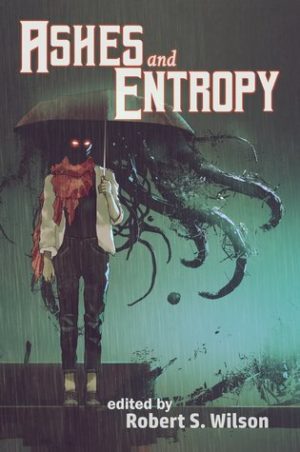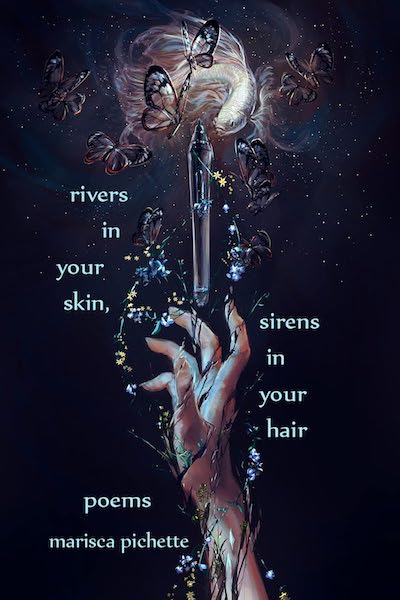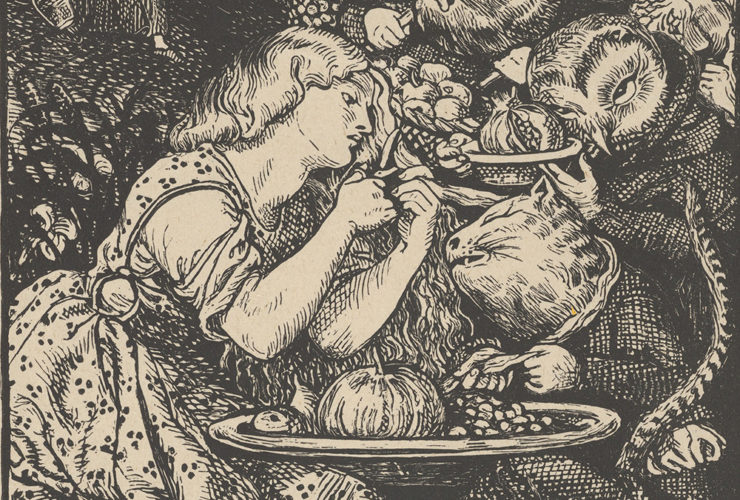Welcome back to Reading the Weird, in which we get girl cooties all over weird fiction, cosmic horror, and Lovecraftiana—from its historical roots through its most recent branches.
This week, we cover John Langan’s “Breakwater,” first published in Robert S. Wilson’s 2018 Ashes and Entropy anthology. Spoilers ahead.
“When she was ready to kill Louise Westerford, she zipped her raincoat and stepped out into the storm.”
The town of Breakwater boasts great ocean views, but a freak storm means that proximity to the Atlantic has ceased to be a selling point. Meteorologists are baffled by the storm’s sudden appearance, and the way it’s stalled over Breakwater for days. The town’s ocean side is underwater, the residents have fled, and soon the sea will engulf its wind-battered remains.
Private detective Maureen is driving straight into the cataclysm. The single cop posted outside Breakwater doesn’t stop her. Probably Louise Westerford has paid to allow her entry.
Maureen’s destination is the Poseidon’s Palace Motel, a cinderblock holdover from Breakwater’s less affluent days. Its parking lot is awash; waves splash the base of its dead neon sign. She and Frank recently spent four days here, despite Frank’s failure to cover his tracks. Maureen, a PI with 20 years’ experience under her belt, should’ve known better—especially since she’s the one Louise originally hired to keep tabs on her young husband. Louise didn’t appreciate the report that Frank wasn’t cheating, and won’t have stopped just because Maureen reported he wasn’t cheating.
Maureen rarely gave advice alongside surveillance reports. But she felt sorry for the reclusive Louise, who surrounded herself with ridiculous occult paraphernalia like leather tomes, stuffed ravens, and crystal balls. So Maureen suggested Louise spend more time with Frank instead of constantly deploying him to represent her at charity events.
Louise’s response was to fire Maureen on the spot. The dismissal stung, but it wasn’t the main reason she later sought out Frank. She felt Louise misjudged Frank and that he should know his wife was having him followed. What he should do was up to him—Maureen was bowing out. Yet when Frank called the next week, she agreed to meet him. Drinks led to a motel room, superb sex and (a rarer pleasure) superb conversation. Their one-night stand turned into an affair. Frank chafed at Maureen’s precautions, asking if it would be so bad if Louise did learn the truth. Obsessed with her mystical studies, she’d want to keep a divorce low-key. Maureen wasn’t convinced: she’s learned through hard experience not to fuck with the rich.
Maureen’s disabused countless adulterers of their happily-ever-after dreams, but she herself was now addicted to that “most dangerous narcotic, hope.” Worse when two weeks passed after their Breakwater idyll with no word from Frank. Maureen grimly followed news of the storm shredding the town in which she’d been so naive. The disaster seemed “an embodiment of the disappointment and hurt weighting her chest.”
And then Frank called. He said one word, “Maureen,” before Louise’s voice told Maureen to check her email. Subject line: “Poseidon’s Palace Room 211.” Contents: a photo of Frank tied naked to a chair, face and body beaten to a “patchwork” of bruises and blood. Instructions: Maureen must come come to Room 211 within twenty-four hours.
Oh, and then Maureen’s e-mail account deleted itself and her computer turned itself into burnt plastic. Louise had some serious hacker-power on her side, and more interest than Frank in covering her tracks. Maureen immediately accessed her cache of emergency funds and fake IDs. (Being a PI has its advantages.) She set up false trails to western New York and Montreal, then headed for Breakwater.
Now, Maureen pulls in to Poseidon’s Palace. Armed with two DIY-silenced handguns, she passes through the deserted motel to Room 211. She shoots two men lurking just inside the door, then the man to the left of Frank’s slumped body, then Louise to Frank’s right, twice, until the woman drops her bloodied carving and falls. There’s a fourth man in the bathroom, whom Maureen also outshoots. She reaches Frank, to find his throat’s been cut. No pulse. Crushed with grief, Maureen knows she must leave his body with the others to be swept away by the storm.
Buy the Book


Summer Sons
Then Frank gives a bubbling wheeze, and struggles in his bindings. Maureen cuts him free, mind racing with questions about how he can be alive, and how to get him to a hospital.
Incredibly, Louise is alive too. She rises, saying with astonishment, “That hurt.”
Maureen shoots her again, in the head. Louise remains standing, her blue eyes now “white, smooth marble orbs.” She commands Maureen to check Frank’s pulse, his heartbeat. Both are still, yet Frank is—undead. Remembering the paraphernalia in Louise’s office, Maureen says, “You’re a witch?”
What Louise is (she monologues at some length) is a woman who’s spent a lifetime learning occult secrets. As she was using her energies elsewhere, she hired Maureen not to watch Frank for infidelity but to guard him from her rivals. It’s to daunt these same rivals that she’s punished Frank and destroyed the site of his adultery. When the waves carry him off, he’ll still be undead, conscious of his own slow decay and of the sea creatures consuming him.
But for Maureen, she plans no similar fate. Instead, she offers a choice, in the form of a telekinetically levitated carving knife. As Frank watches in terror, she explains that Maureen can either cut her own throat or—she can live. If the former, Louise will release Frank from the torture of undeath. If the latter, Maureen will condemn him to that torture and suffer soul-hollowing guilt.
Do Frank’s ruined lips mouth the word Go? Maureen can’t be sure. Her muscles tense at what’s to come next, while Louise watches with blank, pitiless eyes.
What’s Cyclopean: Louise indulges in the villain’s favorite pastime: ranting about how cool she is. Her occult knowledge “was old when the ice sheets weighted the land,” and “would crisp your nerves, char the bones inside you.”
The Degenerate Dutch: Langan avoids easy stereotypes, both for the core characters and for their past experiences.
Weirdbuilding: Small seaside towns are inherently eldritch, especially when being drowned by supernatural storms.
Libronomicon: An “objective correlative,” as Maureen recalls from a college literature course, involves invoking an emotion through associated symbols. Which the storm is indeed doing, but not for Maureen’s emotions.
Madness Takes Its Toll: Maureen, backed into a corner, seeks “an avenue she had overlooked in the insanity of events.”
Ruthanna’s Commentary
Langan has written some of the scariest, most intriguing stuff in this series, weaving weirdness with subgenres ranging from military fiction to apocalyptic epic. The Ashes and Entropy anthology, meanwhile, has offered up brain-breaking ideas from the most personal scales to world-spanning gonzo rock operas. With the caveat that I’m having a terrible month and feeling super-picky about my ancient and undying depredations, this feels like a weak piece for both. Rather well-done private-eye noir crossed with… a supernatural storm and a pissed-off sorceress who invokes deep time imagery? But Louise’s motivations are all too ordinary, not so different from the more mundane crime boss whose threats led Maureen to layer aliases in the first place.
Beyond that, my basic problem here—one that I know many people, or at least many high school literature anthologists, don’t share—is that I’ve never liked “The Lady or the Tiger.” Ambiguity is a valuable technique in the author’s toolbox, but is not the same thing as either leaving off your ending or failing to give your readers enough information to predict characters’ choices. The insoluble dilemma is a hard line to walk, and can easily either fail or feel as artificial as the off-screen system failures that force the resolution of “The Cold Equations.” Much better, albeit harder, to leave unspoken a resolution made inevitable by all that’s come before, or to present truly challenging moral dilemmas in all their nuance.
Just to remind you—or let you avoid high school literature anthologies—“The Lady or the Tiger” involves the world’s worst game of Let’s Make a Deal, in which suspected criminals must choose between two doors. Behind one is a voracious tiger; behind the other is their perfect bride, as chosen by a king who thinks this whole thing is a good idea in the first place. On trial is the princess’s illicit lover. The princess has learned what’s behind each door, and signals him to choose… either death, or marriage to her hated rival. Leaving the reader, along with her ex, to try and decide whether she’s as much of an asshole as her father.
At least we have somewhat more information about Maureen, Louise, and Frank, albeit less agency on Frank’s part. (It would have been a bit closer to the original if Maureen had understood her lover’s attempted signal.) It is cosmic horror-ish, I suppose, that Maureen’s choice is unlikely to make an actual difference to the outcome. If she slits her own throat, Louise seems like the sort to then proceed with feeding Frank to the fishes anyway. If Maureen walks away, Louise seems like the sort to bring her back and kill her slowly, taunting her with her cowardice all the while. If she charges Louise, same general outcome. If she sits on the floor and refuses to accept complicity with the artificial choices offered by evil… that’s probably the right answer morally, but doesn’t actually improve anything. And I can’t imagine Maureen giving Louise the satisfaction of acknowledging that the sorceress is the only one in the room with real power.
But fundamentally, while Louise likes making everyone else feel helpless, this isn’t a story about an impersonal universe. It’s a story about how humans, granted a taste of power from aeons long past, would probably use that power in the service of petty rivalries and petty jealousies and petty destruction. Louise is banal in her depredations despite the forces at her command.
Which is, in fact, probably the story’s point. Humans gonna human, regardless of their access to wonders. I still would’ve liked to see more of the wonders in question, and more of the eldritch forces lurking behind Louise’s humanity.
Anne’s Commentary
Tolkien’s Gildor Inglorion had good advice for Frodo and mortals in general: “Do not meddle in the affairs of Wizards, for they are subtle and quick to anger.” Given how Louise Westerford gives Maureen the boot merely for venturing well-meant advice, I’d say she qualifies as being quick to anger. Nor does she hold back once unrighteously pissed off. But subtle? That she’s not—see her treatment of our ill-fated lovers. Also there’s her taste in office decoration and clothing. No wizard can be without tomes, but crystal balls and stuffed ravens are so over-the-top yesteryear, as is attire too heavily dependent on black.
Maybe Louise goes heavy on the occult doodads as a way to warn employees they’d better not screw with her. Maureen goes into her dealings with Louise prepared to watch her back, because you don’t antagonize the rich, whether of the legitimate or criminal variety. She’s up for any kind of True Detective shenanigans. Too bad she doesn’t realize she’s in an anthology that crosses the noir and weird genres. If she’d only known, she could have pegged Louise as the most dangerous sort of billionaire, one who adds sorcery to her bulging bank account.
Noir classically stacks the odds against its lone wolf investigators, but this is just unfair!
Welcome to the Big Black, baby. The kind that won’t just rough you up or plug you in the gut—this is the voidy darkness that will “crisp your nerves, char the bones inside you.” The kind with secrets that were “old when ice sheets weighted the land.” It could be Louise was old back then, too. Who knows how long she’s lived when she can take bullets to the chest and forehead and keep on levitating carving knives and spewing venomous hate, all while brewing an anomalous hurricane focused on a single Jersey Coast town? Such precise weather enchantment must take a lot of practice.
Poor Frank. His youth and beauty and essential innocence never stood a chance. He is the damsel bound to be in distress when he digs for gold in such dangerous ground as Louise. I was rooting for the necessarily cynical yet not impenetrably hardened Maureen to rescue him, and so herself. Frank is a decent guy, no casual adulterer. Flirting with museum directors, socialites and performers is actually part of his job as Louise’s representative to the world of culture and charity. My cynical assumption is that Louise’s philanthropy is the front that allows her to look like a nice normal filthy rich lady while she pursues her true interests. A handsome and charming husband with a taste for the arts and the good life, what could be a more practical asset? Plus Louise loves Frank, with all the possessive ardor of a greatly powerful woman whose only great responsibility is to herself.
How woefully inadequate for Maureen to call her “a bitch.” Maureen’s no inadequate person, either. Louise admits her “hireling’s” reputation as a PI was impeccable, and Langan spends a good chunk of words to demonstrate Maureen’s professional skills at assuming alternate identities and devising elaborate plans to elude pursuit. Maureen’s also a damn good shot. A decent person, like Frank, she can in extremity be a stone-cold assassin. When she took out Louise and her four minions, my hope (that fatal addiction) soared.
Then Maureen saw that Frank was already dead, throat cut. Wait: Incredibly, Frank is not dead! Wait: More incredibly, Louise isn’t dead either, nor does she obligingly kick off after Maureen blows her brains out. Well, after Maureen puts a mildly oozing hole dead center in Louise’s forehead. Louise isn’t playing fair. Rather, Louise is playing with a whole ‘nother set of rules than those Maureen and the vast majority of humans play by. Forget the impossible storm: Louise (undead herself?) can extend the consciousness of others after death. Because why should anyone who’s pissed her off get out of suffering just because she’s killed them?
Louise gives Maureen the intolerable choice of dying (or maybe undying) in Room 211 or of walking out alive with the knowledge she hasn’t loved Frank enough to save him from post-death torment. To walk won’t save her from a mirror image of the punishment with which Louise threatens Frank—Maureen will leave Poseidon’s Palace soul-dead, body alive, to slowly wither through guilt toward suicide.
What’s Maureen’s choice? Langan ends his story before she enacts it, but not, I think, before she makes it. Louise’s knife is heavy in Maureen’s hand. She will use it on herself, under Louise’s dead-yet-animate white stare.
Louise is one merciless bitch, all right. “Breakwater” is midnight-in-the-coal-cellar-of-Hell noir. Langan wins—I’m running off now in search of a happily-ever-after tale, you know, like “The Shadow Over Innsmouth” or something.
Ah, Innsmouth is so much nicer than expensive-tacky Breakwater, NJ. Book my bus trip.
Next week, we wrap up T. Kingfisher’s The Hollow Places with Chapters 21-22.
Ruthanna Emrys is the author of the Innsmouth Legacy series, including Winter Tide and Deep Roots. Her short story collection, Imperfect Commentaries, is available from Lethe Press. You can find some of her fiction, weird and otherwise, on Tor.com, most recently “The Word of Flesh and Soul.” Ruthanna is online on Twitter and Patreon, and offline in a mysterious manor house with her large, chaotic household—mostly mammalian—outside Washington DC.
Anne M. Pillsworth’s short story “The Madonna of the Abattoir” appears on Tor.com. Her young adult Mythos novel, Summoned, is available from Tor Teen along with sequel Fathomless. She lives in Edgewood, a Victorian trolley car suburb of Providence, Rhode Island, uncomfortably near Joseph Curwen’s underground laboratory.














